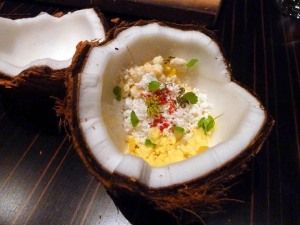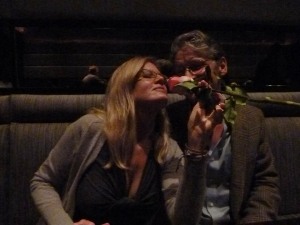One of the benefits to chatting with people as you wait in lines, is the serendipity those conversations can bring. You start out saying hello and you never know what might come next. Recently, what came next while waiting to see a movie at the Telluride Film Festival, was quite literal. Next came next.
Grant Achatz’s new restaurant, Next, comes after his smash hit Alinea, the Chicago restaurant that has been aligned with the avant garde superstars el Bulli and Noma. I had wanted to go there ever since I heard it described as a place that would be in constant evolution, a restaurant that would completely reinvent itself every three months.
I have been told that I wear my interest in all things culinary like a headlight. It never takes long for me to turn the conversation to what’s for dinner, so it is not surprising that within minutes of meeting someone I will be writing down their mother’s recipe for Ethiopian injera bread or punching the address for peerless Kansas City barbeque into my iphone. In this case, all it took was the word “Chicago” for me to ask my young friends in line if they been lucky enough to score the hottest tickets in their hometown.
Tickets, are in fact, exactly what is required to eat at Next. Like a Broadway play, one pays in advance for what is essentially a theatrical experience. The first iteration of Next was a reimagining of Escoffier’s Paris 1906. Once having paid, diners simply delivered themselves over to an event that evoked both time travel and a physical excursion while they enjoyed such rich Belle Époque delicacies as Fillet de Sole Daumont, Supremes de Poussin and Caneton Rouennais a la Presse, or as my husband, who likes to cut the chase, might translate: fish, chicken and duck.
Next’s second iteration, a Tour of Thailand, explored Thai street food. And luckily for me, my fellow moviegoers had 4 extra tickets that they were giving to their parents, good friends who offered to share them with us. If traveling from New York to Chicago for dinner seems extravagant, imagine how much cheaper it is than heading to Thailand, I posited to my indulgent husband.
Was it worth it? Totally! Theater should be fun, even when it is challenging. And Next is both of these. The challenge is in getting there of course, but after that the experience is as delightfully transporting as any of the movies I saw at the film festival.
Riffing on the pungent delights to be found along the sois, or streets, of Bangkok, Grant Achatz and Dave Beran, who is in charge of the kitchen, aim to translate the larky sense of discovery and rich variety that comes with eating from the best street food vendors to their guests. Achatz may be one of the top chefs in the world today, but there is no pretention evident at his restaurant. As if to reinforce this informality while linking the meal one is about to have to a specific place, diners are greeted at the table with a folded Thai newspaper and tropical cocktails (a refreshing mix of guava, mango, papaya and cucumber soda) that are poured into plastic cups. The waiters are relaxed and friendly and one laughs in surprise as the newspapers are unfolded into tablecloths for the first course, a medley of “snacks”: intensely flavored bananas roasted in their skins, crispy prawn cakes with coriander and lime zest, sweet shrimp and chili on mint leaves, fermented pork sausage topped with peanuts and galangal, and pillowy soft steamed buns filled with mushrooms and curry.
There are mini set changes with each course. Newspapers are whisked away and a red runner is thrown across the table. Silverware appears and suddenly, there is soup, the chef’s take on a classic tom yum. Instead of shrimp, there is a glistening piece of umami pork belly waiting for the server to immerse in clear hot and sour broth. Garnished with chili peppers, ginger, Thai basil and tomato. The combination of unctuous pork fat and subtly spicy broth is a more poetic and refined version of the winter staple I slurp with regularity down the street. “I get it,” I am beginning to think. Regular travelers to Thailand might quibble with authenticity, but all the elements of Thai taste are here represented in a new way.
Pretty and tasty condiments are placed on the table: Thai chili paste, a blend of salted duck egg, radish and green mango and a plate of homemade pickles. There is sticky rice, of course, and then a little brazier with one hot coal is put in the center of the table. Above it is placed a silver dish with filets of catfish in caramel sauce, extravagantly topped by ribbons of celery and a gorgeous pink flower. A down-home fish suffused with the uptown richness of caramel and the fresh green crunch of celery? What’s not to love?
For our final entrée, meltingly soft braised beef cheeks in Penang curry sauce with kaffir lime leaves, lettuce and chili peppers is classically Thai, all that we expect it to be and more. The table is animated, stories are being told and confidences shared. We are eating delicious food that is familiar, yet surprising. We are a happy group, and perhaps a little drunk from the clever wine pairings: Hungarian Tokay wine, Txakoli from Spain and French champagne!
Therefore, we are completely ready to party with dessert when four coconuts arrive at the table and we are asked to break them apart. They have already been cracked in half, it turns out. So we lift the tops off easily to reveal an extraordinary combination of young coconut noodles, sweet corn pudding and licorice. A party all on its own.
As a grand finale, four exquisite pink roses are placed on the cleared wooden table. A single petal appears at each place to use as a spoon rest. Pretty pink dragon fruits are presented and we are asked to sniff the rose and taste the fruit, which has been sprinkled with rose water. I know there are critics who love to make fun of the pretentions of chefs who wave scented objects under diners’ noses and talk of the neurobiology of dining. But for me, this one act was enough to shush them all. Scent is an importance element of taste and after such a playful dinner, this act of audience participation was as delicious as it was sensorily delightful. Besides, it made me remember my grandmother’s perfume.
As if to reinforce the fact that grand pretention is on vacation here, the last surprise of the night comes in lieu of after dinner coffee. Four plastic bags of sweet milky Rooibos tea tied shut with rubber bands, with straw poking out, are placed on the table. We leave the restaurant with roses. No money exchanges hands. Our car appears as if by magic and we leave not as if we are leaving a real place, but the idea of a place. Like a dream, this meal can only be remembered because in a few weeks this place will not exist. It will be somewhere else, but really just the idea of somewhere else.
As remarkable as this meal and this restaurant, what is most remarkable about Next has nothing to do with the cuisine. It has to do with the chef, himself. The whole concept of there being a “next” anything in life is something Mr. Achatz doesn’t take for granted. Diagnosed with Stage IV squamous cell carcinoma at the age of 33, he is very, very lucky to be alive. In a particularly cruel twist, the cancer was located in his tongue. Like the protagonist in a Greek myth or a Shakespearean tragedy, the chef was faced with the loss of the very thing that made him great. In order to save himself, was he willing to sacrifice his gift?
In Mr. Achatz’s new book, Life on the Line , written with his business partner Nick Kokonas, he chronicles this harrowing chapter of his life. Going against the advice of the physicians who diagnosed him, Achatz opted not to cut out the tumor, but to try experimental medications that would save his tongue. But chemotherapy and radiation left him ravaged. “ I couldn’t taste a thing,” he writes. “Nothing. Food was cardboard and salt was just sand in my mouth, dissolving slowly and with no purpose.”
Then gradually, flavor by flavor, Achatz regained the use of his taste buds. First it was sweet, then salty, then the savory umami taste of cooked protein. “I would rush into the kitchen, grab a tasting spoon, sand go down the line to see what worked and what didn’t. It was an amazing education to get these building blocks one at a time.”
The results of this reeducation in taste are thrillingly evident. The food at Alinea has never been better. The restaurant has been named the top restaurant in America by the prestigious San Pellegrino Awards committee and as Next reveals, Achatz has never lost his energetic investigative spirit. Alinea, the name for the ¶ sign, means pause or break. Next is the perfect name for what comes after that: a new beginning.
What’s next at Next has actually just started. The theme is Childhood. Tickets are hard to secure, but get your name on the email list: www.nextrestaurant.com. As tickets are released throughout the season, you will be alerted. Or, like me, you can wait for luck to fall in your lap as you sit on a bench waiting for a movie.









